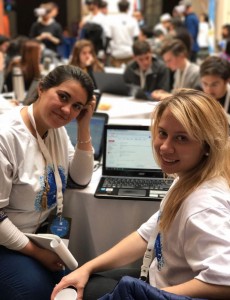In the framework of the public consultation carried out by the Unit on the Rights of Older Persons of the IACHR, Fundeps, together with other civil society organizations, presented a report on national systems for the protection of the rights of older persons at the beginning of this year. the elderly in America.
“Below, we offer a google translate version of the original article in Spanish. This translation may not be accurate but serves as a general presentation of the article. For more accurate information, please switch to the Spanish version of the website. In addition, feel free to directly contact in English the person mentioned at the bottom of this article with regards to this topic”.
In its 2017-2021 Strategic Plan, the Inter-American Commission on Human Rights prioritized the theme of the elderly. To that end, it considered it necessary to identify synergies to advance in the construction of inter-American standards in this area, as well as the development of new working mechanisms, especially to promote the ratification and implementation of the Inter-American Convention on the Protection of Human Rights. Humans of the Elderly and make visible the situation of this population group.
For this reason, in order to prepare a regional report on the rights of older persons, he called for sending information from the member states of the Organization of American States on national systems for the protection of the rights of older persons. America.
The report was presented by Fundeps, the Inter-American Heart Foundation Argentina (FIC Argentina), the Commission specializing in the Rights of Older Adults of the Bar Association of the Province of Córdoba, the Center for Research in the Law of Old Age -National University of Rosario -, the Permanent Seminar on Research on the Law of Old Age -University of Buenos Aires-, the Research Institute on the Law of Elderly and Disability -Universidad Nacional del Centro de la Provincia de Buenos Aires and the Master’s program in Law de la Vejez -Universidad Nacional de Córdoba.
It made explicit the norms and programs that recognize or develop the rights of the elderly in Argentina, making special mention of the Province of Córdoba. Some of the obstacles and challenges for the protection of the rights of the elderly were highlighted, such as: the absence of intersectoral and articulated policies for the promotion of physical activity, the absence of human rights perspective in the regulations of the residences of long stay, the lack of publicity of the residences of long stay enabled.
Likewise, the report included the identification of the institutions and competency frameworks in the promotion of physical activity for the elderly and long-stay residences and the survey of a good practice at the local level -Córdoba- as is the development of the action research project on access to justice for vulnerable sectors – Project AJuV-, carried out through the Office of Human Rights and Justice of the Judicial Branch of Córdoba, from which contextual action strategies are developed to guarantee the effective access to justice for the elderly.
Finally, emphasis was placed on the absence of mechanisms for data collection and analysis of information regarding older persons and the need to have indicators to measure the results of the (few) public policies implemented, in order to monitor and assess progress and challenges.
In this way, the report gives an account – partially – of the situation of the rights of older persons in Argentina, revealing the regulatory insufficiency in an integral manner and the situation of vulnerability to which the elderly are exposed in the country, making it essential to have public policies with a focus on prioritization and inclusion in order to avoid non-compliance with international standards assumed by the Argentine State.
More information
Author
Laura Alesso
Contact
Agustina Mozzoni, <agustinamozzoni@fundeps.org>

